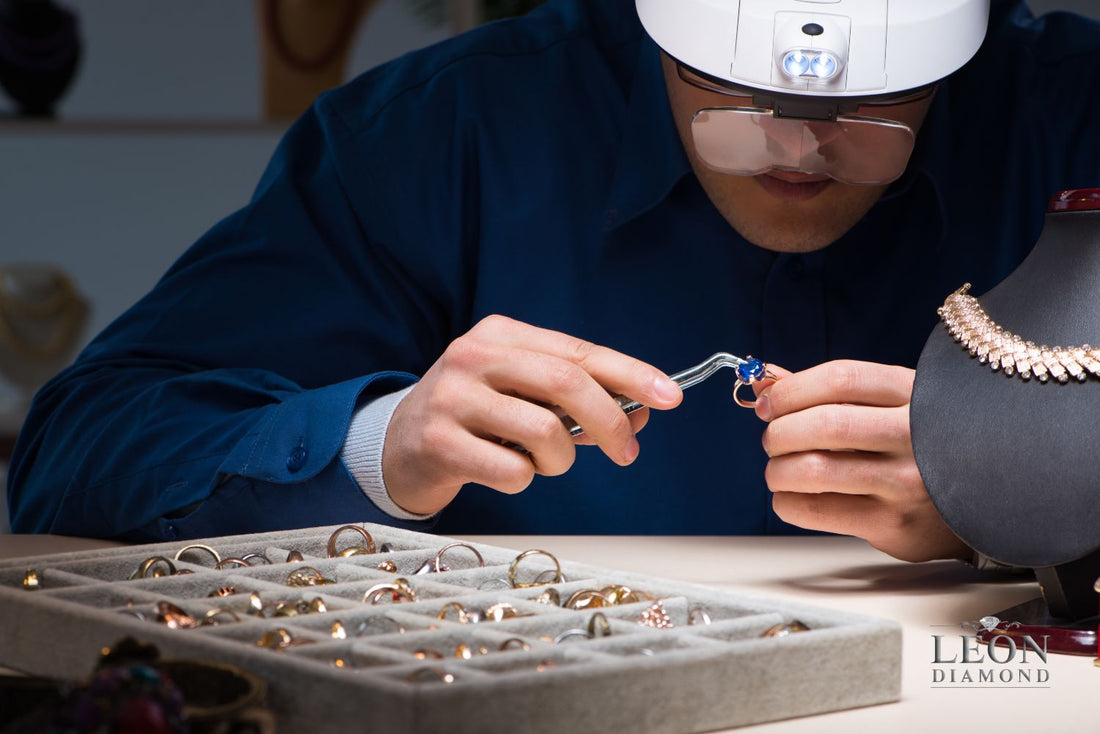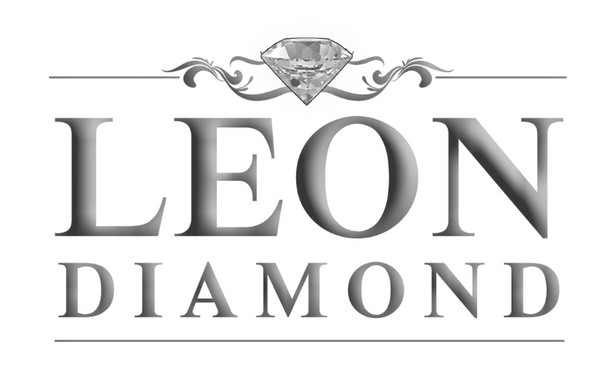
How to Clean and Care for Your Diamond Jewelry at Home
Share
Diamond jewelry gradually loses its brilliance due to exposure to dirt, oils, and everyday wear. Over time, residue from lotions, perfumes, and natural skin oils creates a film on the surface, dulling the diamond’s shine. This buildup can also weaken metal settings, increasing the risk of stone displacement.
According to the Gemological Institute of America (GIA), diamonds attract grease more than any other gemstone, making routine maintenance crucial. Proper cleaning not only restores their sparkle but also extends the life of the jewelry by preventing grime from affecting the structural integrity of prongs and clasps.
By implementing simple at-home cleaning methods for diamond jewelry and scheduling professional inspections, you can maintain your diamond jewelry’s brilliance for years. Using gentle cleaning solutions, soft brushes, and proper storage techniques ensures that your diamonds stay as radiant as the day you bought them.
Why Proper Diamond Care Is Essential?
Proper diamond care is crucial to maintaining its brilliance, as everyday exposure to dirt, oils, and wear can dull its sparkle over time.
How Dirt, Oils, and Everyday Wear Affect Diamond Sparkle?
Diamonds repel water but attract oil. This makes them lose their shine when they come into contact with lotions, perfumes, or natural skin oils. Over time, dirt accumulates, clouding their surface and reducing their ability to reflect light. Daily jewelry, like natural engagement rings and bracelets, collects grime easily. This buildup can harm both their look and strength.
Common Mistakes That Can Damage Diamonds
- Using Harsh Chemicals: Household cleaners containing bleach, chlorine, or ammonia can degrade metal settings and weaken prongs.
- Rough Handling: Excessive scrubbing or using hard-bristled brushes can scratch metal settings or loosen stones.
- Wearing Jewelry During Activities: Exposure to lotions, household chores, or workouts increases dirt buildup and potential damage.
- Improper Storage: Keeping diamond pieces loose with other jewelry can cause scratches, especially with softer gemstones.
Recommended Cleaning Frequency
- Everyday Jewelry (Rings, Bracelets, Earrings): Clean at home once every two weeks to remove surface buildup.
- Occasional Wear Pieces (Necklaces, Special Occasion Jewelry): Clean them once a month to keep them sparkling.
- Professional Cleaning: Visit a jeweler every six months for deep cleaning and inspection of settings.
Signs Your Diamond Jewelry Needs Professional Cleaning
- Dull or Cloudy Appearance: If your diamond lacks sparkle even after home cleaning, it may have deeper grime buildup.
- Loose Settings: If stones feel loose or shift slightly, a professional jeweler should inspect the prongs.
- Discoloration in Metal Settings: If you see tarnishing or dark areas around the diamond, it may be time for professional polishing.
The Best Methods for Cleaning Diamond Jewelry at Home

Keeping your diamond jewelry clean at home is easy with the right techniques. Using safe DIY methods ensures your jewelry stays brilliant without causing damage.
Safe DIY Cleaning Techniques
- Mild Soap and Warm Water: The safest and most effective method, suitable for all types of diamond jewelry.
- Soft Toothbrush for Gentle Scrubbing: Helps remove dirt from settings without damaging metal or stones.
- Microfiber or Lint-Free Cloth for Drying: Prevents water spots and ensures a streak-free finish.
When to Avoid Harsh Chemicals and Ultrasonic Cleaners?
- Avoid Bleach, Ammonia, and Vinegar: These chemicals can erode metal settings over time.
- Be Careful with Ultrasonic Cleaners -They work well, but they can loosen prongs or dislodge diamonds. This makes them not a good choice for older or delicate jewelry.
Step-by-Step Guide to Cleaning Your Diamonds
Before you start cleaning your diamonds, having the right supplies ready ensures a safe and effective process.
Step 1: Gather Your Supplies
Prepare a bowl of warm water, a few drops of mild dish soap, a soft-bristled toothbrush, and a lint-free cloth for drying.
Step 2: Soak the Jewelry
Place your diamond jewelry in soapy water and let it soak for 10-15 minutes to loosen dirt and oils.
Step 3: Gently Scrub
Gently scrub the diamond and its setting with a soft toothbrush. Focus on the crevices where grime builds up.
Step 4: Rinse and Dry Properly
Rinse the diamond jewelry under lukewarm running water, ensuring all soap residue is removed. Pat dry with a microfiber cloth and let it air dry completely before wearing or storing.
Common Mistakes to Avoid When Cleaning Diamonds
Proper cleaning enhances a diamond’s brilliance, but mistakes can lead to damage. Using the wrong cleaning agents or techniques can weaken settings, dull metal, and compromise the stone’s integrity.
Chemicals That Can Damage Diamond Jewelry
- Bleach and Chlorine: Can corrode gold and platinum settings over time.
- Ammonia-Based Cleaners: May weaken prongs, increasing the risk of stone loss.
- Abrasive Cleaners and Baking Soda: Can scratch metal surfaces and create micro-abrasions.
Incorrect Cleaning Techniques
- Scrubbing Too Hard: Excessive brushing can loosen prongs, causing diamonds to shift or fall out.
- Using Toothpaste or Harsh Scrubs: These can leave residue and create surface scratches on the metal.
- Soaking for Too Long: Extended exposure to cleaning solutions may weaken certain metal alloys.
How to Clean Different Types of Diamond Jewelry?

Different diamond jewelry needs special cleaning methods. This helps keep them shiny and strong.
Engagement Rings and Wedding Bands
- Use warm water with mild dish soap and a soft toothbrush to remove dirt from intricate ring settings.
- Avoid ultrasonic cleaners for rings as vibrations can loosen small stones.
Diamond Earrings, Tennis Bracelets, and Pendants
- For diamond earrings, gently wipe the prongs with a lint-free cloth to prevent residue buildup.
- Tennis bracelets should be soaked briefly and then scrubbed gently around each link to remove trapped dirt.
- Pendants require extra care around the chain attachment, as grime often builds in crevices.
Best Storage Practices to Protect Diamond Jewelry
Proper storage prevents scratches, tangling, and unnecessary wear on your diamond pieces.
Why does Storing Diamonds Separately Matter?
Diamonds can scratch other jewelry, including softer gemstones like emeralds or sapphires. To prevent abrasions:
- Store diamond pieces separately in individual compartments or soft-lined boxes.
- Use anti-tarnish pouches for gold or silver settings to prevent oxidation.
Best Jewelry Storage Solutions
- Soft Velvet or Suede Jewelry Boxes: Provide cushioned support to prevent movement.
- Felt-Lined Organizers with Separate Compartments: Keep diamond bracelets, rings, and diamond necklaces from rubbing against each other.
- Travel Cases with Secure Padding: Keep jewelry in place and tangle-free while you travel.
How to Prevent Damage to Your Diamonds?
Diamond durability is high, but improper handling can lead to chips, scratches, or setting damage.
Avoiding Harsh Conditions
- Keep Diamonds Away from Extreme Temperatures: Rapid temperature changes can weaken metal settings.
- Prevent Impact Damage: Even though diamonds are hard, they can chip if hit against a hard surface.
When to Remove Diamond Jewelry?
- Before Swimming: Chlorine in pools and salt water can erode settings.
- During Exercise or Sports: Impact and sweat can loosen prongs or dull metal.
- While Cleaning or Cooking: Harsh detergents, oils, and household chemicals can leave residue on stones.
Professional Diamond Cleaning: When and Why You Need It

Home cleaning works well, but professional care offers deeper cleaning. It also helps keep diamond jewelry in great shape for the long term.
How Jewelers Professionally Clean Diamonds?
- Ultrasonic Cleaning: Uses high-frequency sound waves to dislodge deep-set dirt.
- Steam Cleaning: Removes oil buildup and enhances brilliance without harsh chemicals.
When to Schedule Professional Cleaning and Inspection?
- Every Six Months: Routine deep cleaning maintains sparkle and prevents buildup.
- If Prongs Feel Loose: A jeweler can inspect and reinforce settings.
- Before a Special Occasion: Professional polishing restores a diamond’s maximum brilliance.
Can You Use an Ultrasonic Cleaner at Home?
Ultrasonic cleaners use high-frequency sound waves to remove dirt and debris from diamond jewelry. While effective, they are not suitable for all pieces.
Is Ultrasonic Cleaning Safe for Diamonds?
- Solid Solitaire Settings: Diamonds secured with sturdy prongs can withstand ultrasonic vibrations.
- High-Quality Diamonds: Stones with no visible inclusions or fractures can be safely cleaned.
Risks of Ultrasonic Machines for Certain Diamond Settings
- Pavé and Tension Settings: Vibrations can loosen small diamonds or delicate prongs.
- Fractured or Included Diamonds: Internal flaws may worsen under ultrasonic waves.
- Treated or Enhanced Diamonds: Heat and sound waves may damage clarity-enhanced or coated diamonds.
The Role of Jewelry Insurance and Regular Inspections
Jewelry insurance and regular inspections help protect your investment, ensuring your diamond jewelry retains its value and remains secure over time.
Why Should Diamond Jewelry Be Appraised and Insured?
Diamond jewelry is an investment, making insurance essential in case of loss, theft, or damage. An official appraisal determines market value, ensuring proper coverage.
How do Regular Inspections Help Detect Issues?
- Checking for Loose Prongs: A jeweler can identify weakened settings before diamonds fall out.
- Detecting Hidden Damage: Small cracks or metal wear may not be visible without professional tools.
- Preventing Costly Repairs: Early detection of damage reduces the risk of expensive restoration.
Cleaning and Caring for Lab-Grown Diamonds vs. Natural Diamonds

While lab-grown and natural diamonds share the same brilliance, their cleaning methods have slight differences to ensure longevity and shine.
Are Lab-Grown Diamonds Cleaned the Same Way as Natural Diamonds?
Yes, lab-grown diamonds have the same chemical, physical, and optical properties as natural diamonds. Cleaning methods, including mild soap, warm water, and soft brushing, apply to both.
Special Care Considerations for Lab-Grown Diamond Jewelry
- Avoid Harsh Chemicals: Clarity-enhanced lab diamonds may react to strong cleaning agents.
- Check for Loose Settings: Lab-grown diamonds are often set in lighter metals, requiring careful handling.
Keep Your Jewelry Youthful Forever!
To keep diamond jewelry shining and lasting, proper cleaning and maintenance are key. Clean it regularly with mild soap and water. Also, schedule professional inspections to keep diamonds secure. Avoid harsh chemicals and check for loose settings. Proper storage will help protect your investment.
For long-term care, schedule cleanings every six months. Also, store your jewelry properly to avoid scratches. If investing in diamond jewelry, consider getting it appraised and insured for added security.
At Leon Diamond, we provide annual in-store cleaning services, ensuring your diamonds maintain their brilliance year after year.
Contact Leon Diamond today for a professional inspection and deep cleaning to keep your jewelry in perfect condition!
